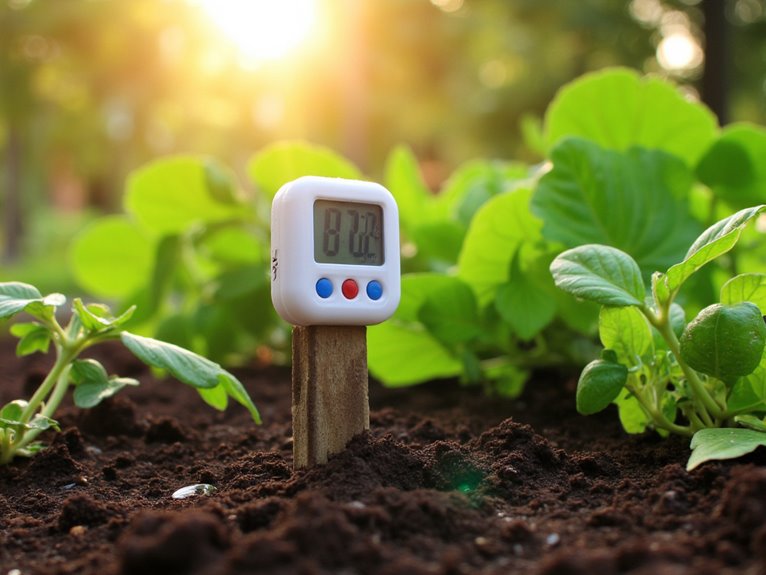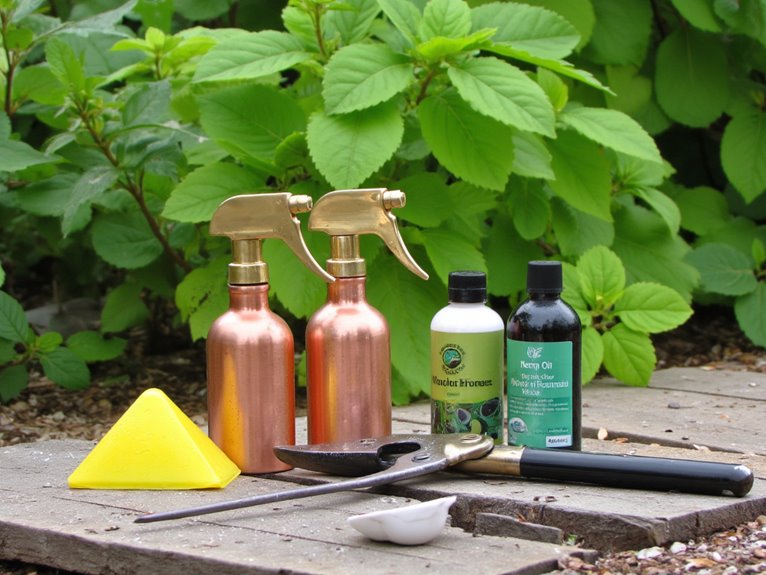Next-Level Plants: Ready to Try Something New?
Transform your garden with next-level plants that go beyond basics! Borage and goldenrod draw pollinators with vibrant blooms, while CRISPR-edited crops offer climate resilience. Try compact bonsai or container-friendly succulents for small spaces. Discover award-winners like Nepeta ‘Cat’s Meow’ or Hosta ‘Shadowland’ for striking beauty. Extend seasons with bloomers like zinnias and petunias. These plants blend science, style, and sustainability—perfect for gardeners seeking something fresh. Want to know how to pair them with your existing landscape?
Notable Insights
- Discover pollinator-friendly plants like borage and goldenrod for vibrant garden ecosystems.
- Explore innovative seed technologies that create resilient, climate-adapted crops.
- Grow compact bonsai trees or dwarf magnolias to maximize space in any garden setting.
- Try award-winning varieties such as Nepeta ‘Cat’s Meow’ for unique beauty and historical significance.
- Plant season-long bloomers like zinnias and petunias for continuous color in your landscape.
Pollinator-Friendly Varieties
Whether you’re planting for the first time or expanding your garden, choosing pollinator-friendly varieties creates a welcoming habitat for bees, butterflies, and other essential pollinators. These plants support healthy pollination dynamics by offering nectar, pollen, and shelter throughout the growing season. For instance, borage attracts hummingbirds and bees with its blue star-shaped flowers, while goldenrod provides vital late-season resources. Understanding plant pollinator interactions helps you select species that thrive in your climate and complement each other in the ecosystem. Cosmos and cuphea offer extended blooming periods, ensuring consistent food sources. Pair these with native trees like red maple or shrubs such as serviceberry for a diverse, resilient garden that benefits both people and pollinators alike. When planning your pollinator garden, consider incorporating eggplants which thrive with balanced nutrients and can provide additional habitat diversity while supporting your overall garden ecosystem. diverse plant selections create complex habitats that support a wider range of pollinator species.
Innovative Seed Technology
If you’re curious about how seeds are evolving beyond just what meets the eye, innovative technologies are transforming plant genetics and growth potential. CRISPR editing creates climate resistant crops like drought-tolerant maize and flood-resistant rice, while hybrid varieties combine parent plant strengths for better yields. Nutritional enhancement techniques fortify staples like rice to cut pesticide use and boost health benefits. Seed treatments with bio-based coatings protect against diseases and extreme weather, supporting sustainable farming. These advances promise more resilient gardens and farms, helping you grow food that thrives in changing conditions.
The genomic breeding techniques approach accelerates development of crops with precisely desired traits, enabling farmers to cultivate plants that perform better under challenging environments.
Compact and Versatile Plants
As you’ve seen how plant genetics are being refined for resilience, consider how compact and versatile plants offer practical solutions for gardens of all sizes. Bonsai art perfects this trait, transforming trees into miniature masterpieces that thrive in small spaces. Pair these with rock arrangements for dramatic contrast—succulents nestled among stones create textural interest without overwhelming the landscape. Compact plants like serissa or dwarf magnolias require less pruning and fit snug niches effortlessly. Their low-maintenance nature makes them ideal for busy gardeners, while their ability to thrive in containers expands possibilities for urban spaces. Whether you’re crafting bonsai displays or layering rock gardens, these plants demonstrate how size limitations can inspire creative horticultural solutions. When selecting containers for these compact arrangements, ensure proper drainage to prevent root rot and promote healthy growth.
Environmental impact is also significant, as compact gardens typically use less water and require fewer resources for maintenance, making them more sustainable than traditional landscaping approaches.
Award-Winning Plants
You might already appreciate how compact plants like bonsai thrive in small spaces – but what about those that have earned formal recognition for exceptional performance? Award-winning plants carry Historical Significance as champions of garden innovation. Cultural Impact spreads through their popularity in landscapes worldwide.
Brunnera ‘Jack of Diamonds’ dazzles with its unique foliage, while Nepeta ‘Cat’s Meow’ adds color and charm. Hostas like Shadowland ‘Miss America’ bring elegance with their striking variegation. These plants reflect human appreciation for beauty and resilience across generations.
Whether you’re a seasoned gardener or just starting out, these award-winners offer reliable performance and visual appeal. They embody our connection to nature through thoughtful cultivation practices passed down through time.
Season-Long Bloomers
Want to transform your garden into a canvas of constant color? Season-long bloomers deliver just that—with flowers popping up repeatedly from late spring through fall. These resilient plants have been part of Historical cultivation for centuries, offering reliable beauty year after year. Look for varieties with strong disease resistance to keep blooms looking fresh longer. Zinnias and petunias add vibrant pops, while perennials like gaura provide structure even when they’re not in full bloom. Regular deadheading and feeding help extend their flowering period. Whether you’re planting in beds, containers, or along borders, these plants make it easy to enjoy color without the hassle of constant replanting. To keep your beautiful blooms protected from unwanted visitors, consider chemical-free pest control solutions that won’t harm your plants or beneficial pollinators.
Frequently Asked Questions
What’s the Difference Between Annuals and Perennials in Your Collection?
Annuals bloom all season and need more care, while perennials return yearly with less work. You can use annuals for quick color or pollination techniques, but perennials improve soil pH testing methods over time—perfect for a lasting garden vibe.
Can These Plants Thrive in Containers or Are They Garden-Only?
You can grow many plants in containers with proper Container Tips like drainage and size, but some need Garden Basics you can’t replicate in pots. Research each plant’s needs before buying.
Do Any of These Varieties Require Special Soil Conditions?
Yes, these varieties need special soil conditions—Soil myths say regular potting mix works, but Compost secrets reveal tropical plants crave acidic, well-draining soils with high organic matter. You’ll need to adjust pH and add perlite or bark for their rainforest-inspired needs.
Are There Options for Regions With Hot Summers?
Yep, there are options for hot summers! Check out Heat Hardy Herbs like thyme or sage, and Southside Shade Solutions such as Japanese zelkova. These plants toughen up under the sun’s stare, needing less water and love. You’ll be gardening in no time.
How Do I Know Which Plants Are Drought-Tolerant?
You can tell drought-tolerant plants by their thick leaves, deep roots, or waxy coatings — look for those signs! Companion planting with these helps your garden survive dry spells, and they’re great for Pest Control too.
On a final note
As you ready your garden for transformation, remember that these plants offer more than just beauty—they support pollinators, thrive in diverse conditions, and deliver year-round color. Whether you’re limited by space or seeking awards-worthy specimens, there’s a perfect fit for your landscape. Embrace the change and watch your outdoor space flourish with newfound energy and meaning.






